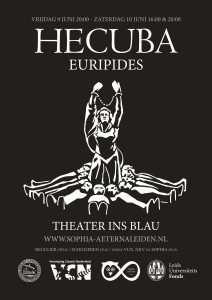On June 9 and 10, 2023, the student theater group of the Classical Languages programme at Leiden University performed Euripides' Hecuba four times.

Euripides’ Hecuba:
Euripides' Hecuba:
They fought for ten years in vain for Troy - but through a clever trick with a large wooden horse, the Greeks were able to take the city in one night. The Trojans who did not die in the fighting that night were enslaved and taken to the coast of Thrace on Greek ships. Most stories about the Trojan War end here, or they continue with the fate of the winners, Odysseus and Agamemnon for example. But what happened to the victims? In his Hecuba the Greek playwright Euripides tells us what fate awaited Hecuba, the ancient queen of Troy. She was once a happy mother, but she had to watch all her sons and daughters die in the last days of the battle for the city - except for three children: her daughters Cassandra and Polyxena and her son Polydorus are still alive. But for how long? The ghost of Achilles demands that Polyxena be sacrificed on his burial mound, and Polydorus, who should be staying safely with King Polymestor, has not been heard from for a long time...
The students of the courses Greek and Latin language and culture and Classics and Ancient Civilizations play and sing the most tragic of all tragedies under the direction of Christoph Pieper. Hecuba is a tragedy about universal themes such as mourning and sorrow. A tragedy that deals with the horrors of war and draws attention to those less fortunate. A tragedy that questions the concepts of "good" and "evil" - because even the most unreasonable Greek may still harbor a spark of compassion.